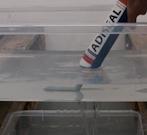Water Proof Sealer
Water Proof Sealer: Preserving Surfaces with Reliable Protection
When it comes to safeguarding surfaces from water damage, a water-proof sealer is an essential solution. In this article, we will explore the functionality, applications, and advantages of water proof sealers. Discover how these specialized sealers provide reliable protection against water intrusion and help maintain the longevity of various surfaces.

Understanding Water-Proof Sealers
1. The Purpose and Importance of Water-Proof Sealers:
– A water proof sealer is designed to create a protective barrier that repels water and prevents its penetration into surfaces.
– Its primary function is to enhance the water resistance of materials and safeguard them from potential damage caused by moisture.
2. Applications of Water-Proof Sealers:
– Water-proof sealers find a wide range of applications in both indoor and outdoor settings, including residential, commercial, and industrial projects.
– Common areas of application include concrete surfaces, wood furniture, masonry structures, and outdoor decks.
Benefits and Features
1. Water Resistance:
– Water-proof sealers provide exceptional resistance against water penetration, preventing moisture-related issues such as rot, mold, and warping.
– They act as a protective shield, ensuring the longevity and durability of various surfaces.
2. Versatility:
– Water-proof sealers are compatible with a wide range of materials, including concrete, wood, stone, and tile.
– They can be applied to different surfaces, offering versatile protection against water damage.
3. UV Resistance:
– Many water-proof sealers come with UV-resistant properties, protecting surfaces from the harmful effects of the sun’s rays.
– This feature prevents fading, discoloration, and degradation of materials exposed to direct sunlight.
4. Easy Application and Maintenance:
– Water proof sealers are typically easy to apply, either through brushing, rolling, or spraying, depending on the product.
– They require minimal maintenance, reducing the need for frequent reapplication.
Best Practices for Application
1. Surface Preparation:
– Clean the surface thoroughly, removing dirt, debris, and any previous coatings.
– Ensure the surface is dry before applying the water-proof sealer to ensure optimal adhesion and effectiveness.
2. Application Techniques:
– Follow the manufacturer’s instructions regarding the application method and coverage rate for the specific sealer.
– Apply an even and consistent coat of the water-proof sealer, ensuring full coverage of the surface.
3. Drying and Curing Time:
– Allow sufficient drying and curing time for the sealer to develop its protective properties.
– Avoid exposing the treated surface to water or heavy traffic until the sealer has fully cured.
Conclusion
Water proof sealers are invaluable when it comes to protecting surfaces from water damage and maintaining their integrity over time. With their exceptional water resistance, versatility, UV resistance, and ease of application, these sealers provide reliable protection for a wide range of materials and surfaces. By following proper surface preparation and application techniques, you can ensure the effectiveness and longevity of water-proof sealers. Whether it’s protecting concrete driveways, wooden decks, or masonry structures, water-proof sealers play a vital role in preserving surfaces and minimizing the risk of water-related damage.